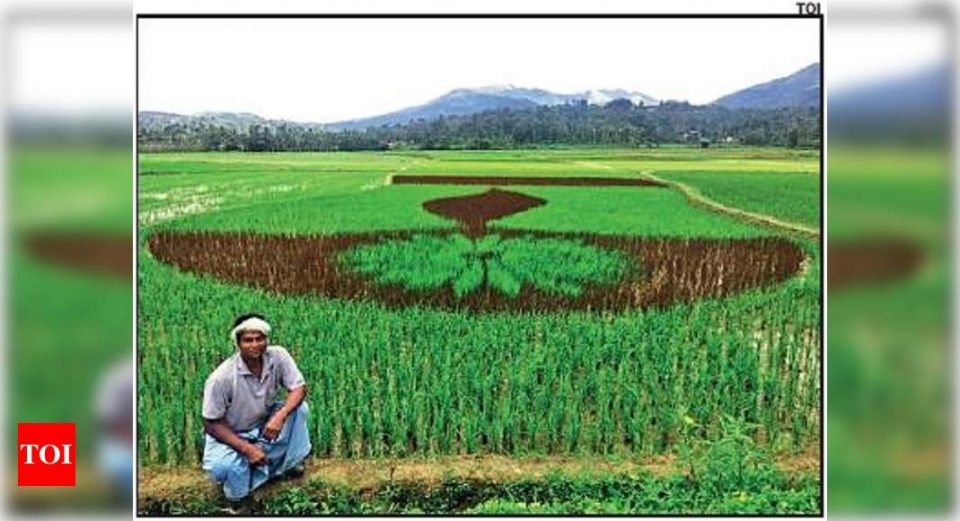LUCKNOW: Even as the standoff between the farmers and the government continues to rage over the three farm laws, paddy procurement in UP has registered an increase of 14% till date in comparison to last year.
According to data from the food and civil supplies department, paddy procurement has risen from 56.7 lakh metric tonnes (MT) in 2019-20 to around 64 lakh MT till date.
“This is not the final figure as the procurement process would continue till February-end. The procurement is expected to be much more than last year,” food commissioner Manish Chauhan told TOI. The procurement of paddy, which is a kharif crop, starts from October.
Govt seeks to increase wheat purchase centres
Procurement of agricultural produce at stipulated minimum support price (MSP) has been one of the key sticking points between the agitating farmers and the government.
Nationally, paddy procurement has grown by around18% to over 614 lakh MT. In the corresponding period last year, paddy procurement was around 520 lakh MT, sources said. Of the total purchase of 614 lakh MT, Punjab alone has contributed around 202 lakh MT, which is 33% of the total procurement.
The development comes almost a week after CM Yogi Adityanath directed officials to expedite procurement of paddy while setting up more purchase centres so that farmers may sell their produce at the government-administered price. He had asked officials to regularly review paddy purchase proceedings and ensure that farmers do not face any inconvenience in selling their produce. At the same time, the state government seeks to increase wheat purchase centres from 5,000 to 6,000 in the forthcoming season.
The Centre procures wheat and rice to meet its requirement under the National Food Security Act and other welfare schemes. It procures other crops like pulses, oilseeds, coarse cereals and cotton, if market prices fall below MSP.
Thousands of farmers, mainly from Punjab, Haryana and western Uttar Pradesh, have been staging a protest at Delhi borders for over two months now, seeking repeal of three laws that were enacted in September. The farmer unions have been demanding a legal guarantee of MSP.
Eleven rounds of talks have been held between the government and 41 farmer unions to break the deadlock but the stalemate continues. The farmer unions have rejected the government’s offer to suspend the laws for 1.5 years and form a joint committee to find solutions. These laws have already been stayed for implementation till further order by the Supreme Court.
According to data from the food and civil supplies department, paddy procurement has risen from 56.7 lakh metric tonnes (MT) in 2019-20 to around 64 lakh MT till date.
“This is not the final figure as the procurement process would continue till February-end. The procurement is expected to be much more than last year,” food commissioner Manish Chauhan told TOI. The procurement of paddy, which is a kharif crop, starts from October.
Govt seeks to increase wheat purchase centres
Procurement of agricultural produce at stipulated minimum support price (MSP) has been one of the key sticking points between the agitating farmers and the government.
Nationally, paddy procurement has grown by around18% to over 614 lakh MT. In the corresponding period last year, paddy procurement was around 520 lakh MT, sources said. Of the total purchase of 614 lakh MT, Punjab alone has contributed around 202 lakh MT, which is 33% of the total procurement.
The development comes almost a week after CM Yogi Adityanath directed officials to expedite procurement of paddy while setting up more purchase centres so that farmers may sell their produce at the government-administered price. He had asked officials to regularly review paddy purchase proceedings and ensure that farmers do not face any inconvenience in selling their produce. At the same time, the state government seeks to increase wheat purchase centres from 5,000 to 6,000 in the forthcoming season.
The Centre procures wheat and rice to meet its requirement under the National Food Security Act and other welfare schemes. It procures other crops like pulses, oilseeds, coarse cereals and cotton, if market prices fall below MSP.
Thousands of farmers, mainly from Punjab, Haryana and western Uttar Pradesh, have been staging a protest at Delhi borders for over two months now, seeking repeal of three laws that were enacted in September. The farmer unions have been demanding a legal guarantee of MSP.
Eleven rounds of talks have been held between the government and 41 farmer unions to break the deadlock but the stalemate continues. The farmer unions have rejected the government’s offer to suspend the laws for 1.5 years and form a joint committee to find solutions. These laws have already been stayed for implementation till further order by the Supreme Court.


